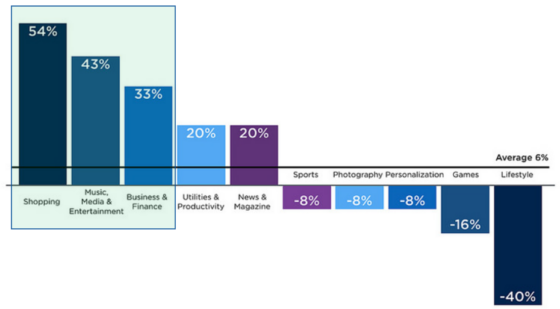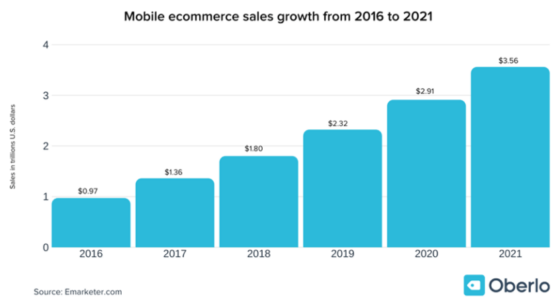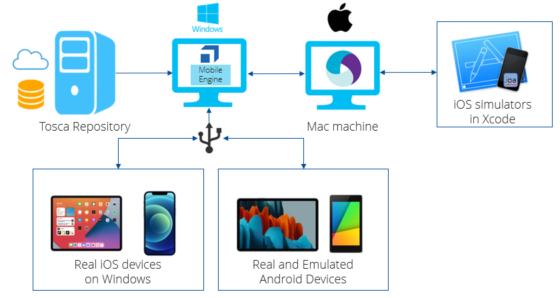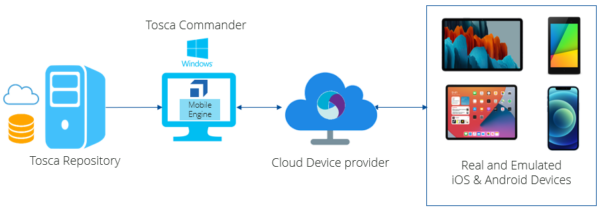
Tricentis AI Workspace overview
Explore how Tricentis AI Workspace enables autonomous quality at...
With Tosca version 15.0, Tricentis puts mobile at the heart of our automation strategy. Get a first look at the key enhancements.
Mobile-first companies are taking over the enterprise market. According to Statista, mobile devices generate nearly 50% of global website traffic, with retail, media, business, and finance having the highest growth rate.

Mobile commerce growth has seen an average year-over-year increase of more than 33% since 2016, reaching total revenues of $3.56 billion in 2021. With the number of mobile users currently at 5.1 billion and growing, as far as trends go, there’s nothing to indicate that mobile commerce growth will stop anytime soon. To capitalize on this market, delivering a high-quality user experience is critical.

Cloud: 83% of enterprise workloads are in the cloud
Transformation: The mobile industry is transforming
User experience: Focus on user experience
With Tosca version 15.0, Tricentis puts mobile at the heart of our automation strategy, delivering a new robust mobile engine that emphasizes usability, user experience, performance, coverage, simplified mobile cloud connectivity, and more. For a first look and a demo of the key enhancements, join us for the mobile testing webinar.
Key enhancements in Tosca 15.0 include:
To see a demo of these features, join us for a webinar on Feb. 9.
Have you ever thought of automating your test suites of iOS mobile apps on Windows?
The answer would probably be a definite “no,” because Xcode (the Integrated Development Environment [IDE] used to design and develop an iOS app) keeps you from automating and developing mobile apps on Windows. You couldn’t buy a PC running macOS because unlike Windows, Apple doesn’t let anyone license its OS with other manufacturers.
Times have changed and Tricentis managed to overcome the infrastructure requirement of having a macOS workstation to automate the testing of iOS devices. Now Tricentis Tosca contains everything you need to automate your test suites with iOS applications.
The new Tosca Mobile Engine enhances Appium’s driver and enables you to run iOS test automation on Windows, without the need for macOS or Xcode! Simply connect any iOS device to your Windows machine with Tricentis Tosca – as you usually do with Android devices – and start developing and executing automated mobile testing.

Flutter, which enables cross-platform app development, gives developers an easy way to build and deploy visually attractive, natively-compiled applications for mobile (iOS, Android), web, and desktop – all using a single tool. Despite its advanced capabilities and support, Flutter has its own testing libraries, but it usually requires a debug build. Tosca Mobile, on the other hand, provides you with great flexibility for testing Flutter-based iOS and Android apps. The new Tosca Mobile Engine, available in Tosca version 15.0, lets users develop and execute automated mobile testing scenarios against both debug and release builds.

React Native is an open-source mobile application framework created by Facebook, Inc. It is used to develop applications for Android, Android TV, iOS, macOS, tvOS, web, Windows, and UWP by enabling developers to use React’s framework along with native platform capabilities. Using the latest Tosca Mobile Engine available in Tosca version 15.0, users can develop and execute automated mobile testing scenarios against both debug and release builds.

The new Tosca Mobile Engine delivers major engine and architecture changes, resulting in a high performing platform for both test development and execution. This applies to both local device execution as well as mobile cloud support.
With Tosca, you can now run mobile tests on your desktop, DIY device farms, while also seamlessly integrating with cloud-based device farms. Because Tosca Mobile is cloud agnostic, you can use mobile devices from your mobile device farm of choice and experience simplified device connectivity for both test development and execution.

In today`s fast-paced world, velocity is the key, so it’s critical to begin testing mobile apps as early as possible. Developers can do that by testing the SUT with emulators and simulators. They can deploy their apps in the early stages of development and examine the look and feel of the tested mobile app. With Tosca 15.0, we’ve enriched the Mobile Engine with the support for mobile device emulators and simulators, in addition to real devices, which supports a shift-left approach and can also be used for debugging.
To learn more and see the new Tosca Mobile Engine in action, check out the webinar, Simplify mobile-first testing with Tricentis Tosca 15.0.

Explore how Tricentis AI Workspace enables autonomous quality at...

From agentic AI to API simulation, Tosca’s cloud deployment is...

Learn how AI-driven quality intelligence transforms QA to test what...

Transform your manual testing workflow to deliver higher quality...

Join us for a preview of some of the most notable features on the...

Achieve continuous performance excellence — detect issues early,...